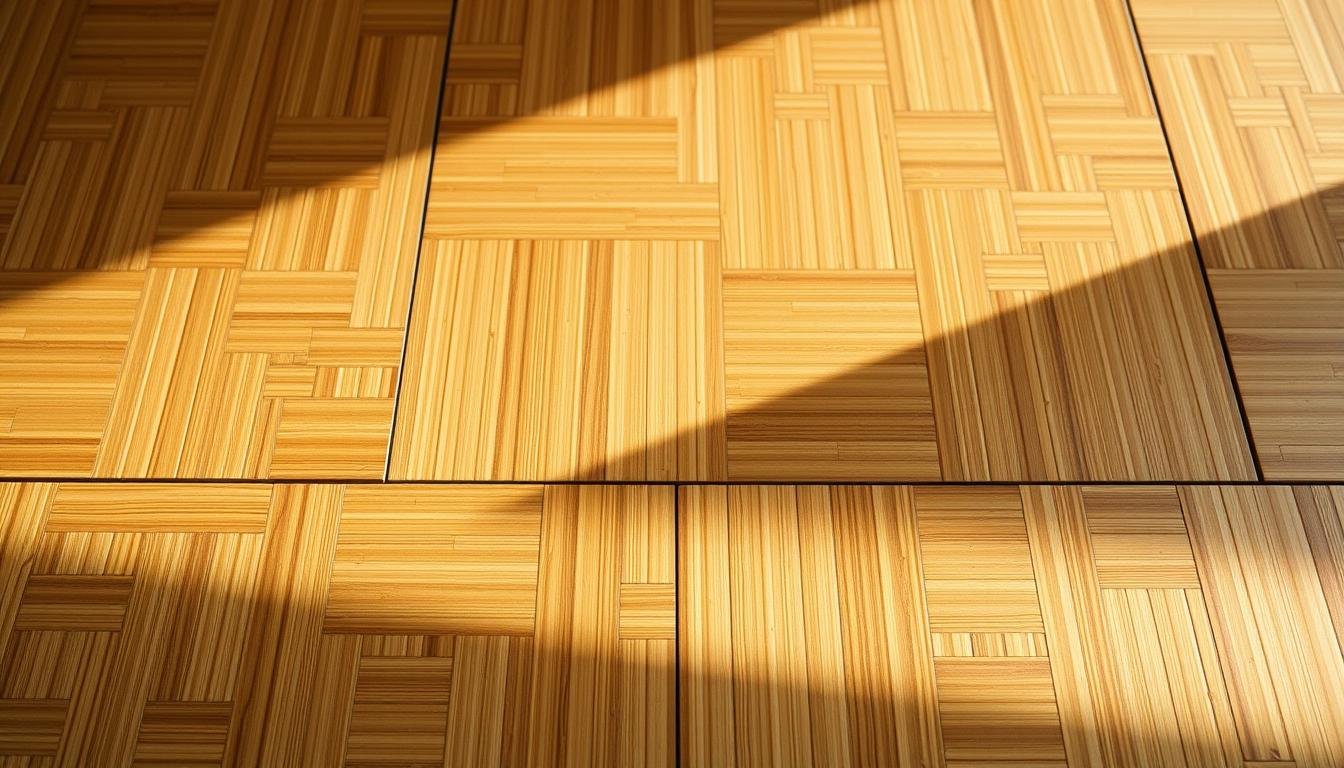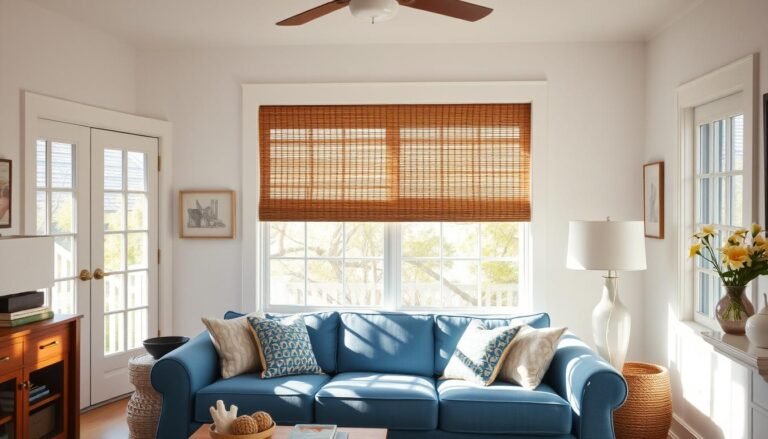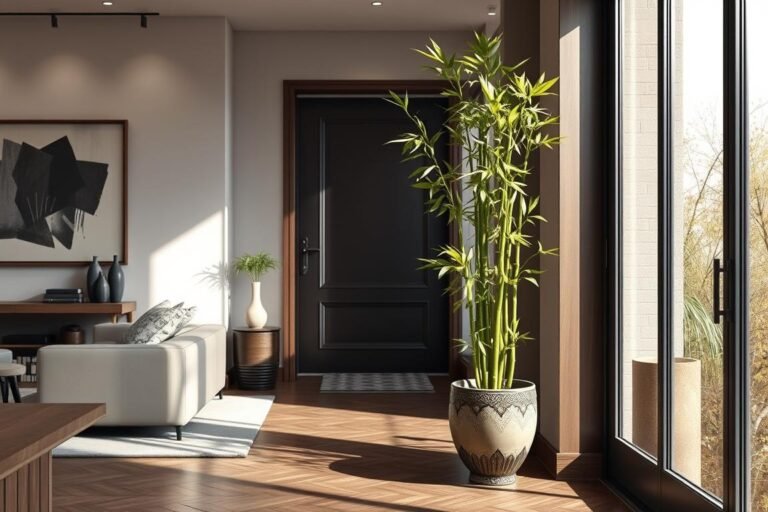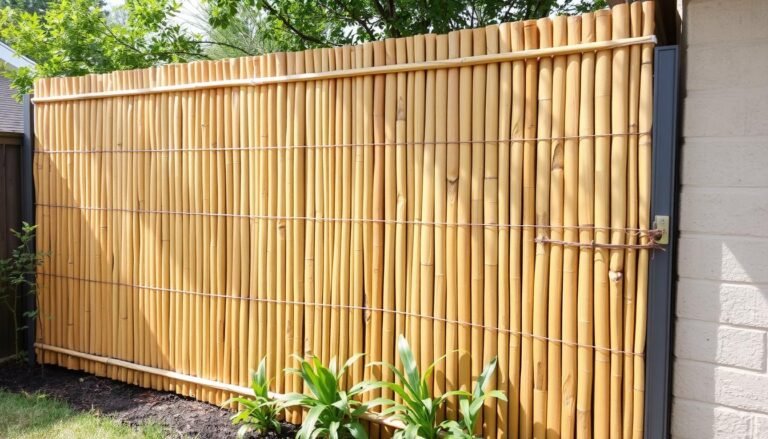Are eco-friendly bamboo tiles a good choice for homeowners looking for a green and stylish floor?
We look into the waterproof and durable sides of bamboo tiles. They are known for being water-resistant. This makes them a great option for places where spills happen often.
We’ll dive into the good and bad of bamboo tiles. We’ll talk about how long they last, if they’re good for the planet, and what they look like. This will give you a clear picture of what these tiles can offer.
Key Takeaways
- Understanding the waterproof characteristics of bamboo tiles
- Examining the durability and sustainability of bamboo tiles
- Exploring the eco-friendly benefits of bamboo tiles
- Discussing the importance of proper installation and maintenance
- Comparing bamboo tiles with other sustainable flooring options
Introduction to Bamboo Tiles
Bamboo tiles are a standout in sustainable flooring. They’re not just a passing trend but a big step towards green home decor. People are increasingly choosing bamboo for flooring because of its special qualities and eco-friendly benefits.
What Are Bamboo Tiles?
Bamboo tiles are crafted from bamboo, a fast-growing resource. The bamboo for these tiles is usually harvested between 5 to 7 years old. This makes bamboo a quicker-to-renew material than traditional wood.
The making of bamboo tiles involves several steps. First, the bamboo is harvested and then its outer layer is removed. Next, it’s sliced into thin strips and pressed into planks. This method ensures the tiles are both durable and beautiful.
How Are They Made?
The making of bamboo tiles is detailed and green. First, the bamboo is harvested and its outer layer is stripped off. Then, it’s cut into thin strips and shaped into planks.
This process boosts the tiles’ strength and beauty. The end result is a product that’s eco-friendly and eye-catching.
Benefits of Using Bamboo Tiles
Bamboo tiles have many benefits, making them a great choice for homes. Some key advantages include:
- Eco-friendly: Bamboo is a sustainable resource that needs little pesticides and fertilizers.
- Durability: Bamboo tiles are strong and long-lasting.
- Aesthetic Appeal: They come in various styles and finishes, improving any room’s look.
Choosing bamboo tiles means getting a beautiful, green, and lasting flooring option. As we dive deeper into bamboo tiles, it’s clear they’re a great alternative to traditional flooring.
Waterproof and Durability Insights
When thinking about bamboo tiles for your home, it’s key to know about their waterproof and durable sides. Bamboo flooring is eco-friendly, but how it holds up in different situations matters a lot.
Are Bamboo Tiles Waterproof?
Bamboo tiles aren’t fully waterproof, but they can handle water to some extent. Strand woven bamboo stands out for being really durable and water-resistant.
Here’s what affects how well bamboo tiles handle water:
- Type of bamboo: Strand woven, carbonized, or natural
- Manufacturing process: Including the type of adhesive used
- Finish: The type of finish applied to the bamboo
- Maintenance: Regular cleaning and maintenance practices
How Durable Are Bamboo Tiles?
Bamboo tiles are quite durable, with strand woven bamboo being the top choice. Their durability comes from being dense and how they’re made.
Here are some important points about bamboo tile durability:
- High-density bamboo is more resistant to scratches and dents.
- The finish applied can enhance durability by providing an additional layer of protection.
- Proper installation is key for bamboo tiles to last long.
Factors Affecting Durability
Several things can impact how long bamboo tiles last, including:
- Moisture levels: High moisture can weaken bamboo.
- Maintenance practices: Regular cleaning and avoiding harsh chemicals can help bamboo tiles last longer.
- Foot traffic: Places with lots of people walking need more durable flooring.
Knowing these factors helps homeowners make their bamboo tiles last longer.
Sustainability and Eco-friendliness
Bamboo tiles are great because they’re sustainable. Bamboo grows fast and can be harvested every 5-7 years. This is much quicker than traditional hardwoods, which take decades to grow.
Bamboo as a Sustainable Resource
Bamboo grows quickly and can regrow without replanting. This makes it a eco-friendly choice over traditional wood. Using bamboo tiles makes a room look good and helps the planet.
Harvesting bamboo is kinder to the environment than cutting down trees. Bamboo needs less water and pesticides. It also helps clean the air by absorbing carbon dioxide and making oxygen.
Environmental Benefits of Bamboo Tiles
Bamboo tiles have many environmental perks. The way they’re made often includes eco-friendly practices. This means they use products that don’t harm the air inside homes.
- They have a lower carbon footprint because bamboo grows fast.
- Harvesting bamboo is less harmful to the environment than cutting down trees.
- Many makers use green production methods.
Comparison with Traditional Materials
Bamboo tiles are more sustainable than traditional materials. Hardwoods take a long time to grow, but bamboo is ready in less than a decade. Bamboo tiles also look good, like hardwood, but are better for the planet.
| Material | Renewal Time | Environmental Impact |
|---|---|---|
| Bamboo | 5-7 years | Low |
| Hardwood | Decades | High |
| Synthetic Tiles | N/A | Variable |
Choosing bamboo tiles is a smart, stylish choice. It’s good for your home and the planet. We suggest thinking about the long-term benefits of bamboo tiles.
Price Ranges for Bamboo Tiles
The cost of bamboo tiles varies based on quality and installation. Knowing these factors helps you choose within your budget and needs.
Average Price Per Square Foot
Bamboo tiles cost between $2 and $10 per square foot. Strand woven bamboo is pricier because it’s durable and dense. Professional installation also increases the total cost.
Factors Influencing Price
Several things affect bamboo tile prices:
- The quality of the bamboo: Better quality means higher cost.
- Type of bamboo: Strand woven is more expensive.
- Installation costs: Hiring pros adds to the bill.
- Location and supplier: Prices differ by where you buy.
Budget-friendly Options
Looking to save money? Here are some budget-friendly options:
- Choose lower-grade bamboo for good quality at a lower price.
- Go for less expensive bamboo types like horizontal or vertical.
- Install the tiles yourself to cut down on costs.
By knowing what affects bamboo tile prices and looking for affordable choices, you can find a solution that fits your budget and values.
Pros and Cons of Bamboo Tiles
Bamboo tiles are eco-friendly and durable, but they have their downsides. Let’s look at the good and bad sides of bamboo tiles. This will help you decide if they’re right for your home.
Advantages of Using Bamboo Tiles
Bamboo tiles have many benefits. They are:
- Eco-friendliness: Bamboo is a renewable resource, making it good for the planet.
- Durability: Bamboo tiles are tough and can handle a lot of use.
- Aesthetic appeal: They come in many styles and finishes, adding a natural beauty to your home.
Bamboo tiles also stand up well to lots of foot traffic. They’re great for busy homes. Plus, they’re good for the environment, which is a big plus for eco-conscious people.
Disadvantages to Consider
But, there are some downsides to bamboo tiles:
| Disadvantage | Description |
|---|---|
| Susceptibility to scratches | Bamboo tiles can get scratched if not taken care of. |
| Moisture sensitivity | They can get damaged by too much water, so you need to be careful when installing and maintaining them. |
| Limited refinishing | Unlike hardwood, bamboo tiles might not be able to be refinished as easily. |
It’s important to think about these downsides and the upsides. Taking good care of your bamboo tiles can help avoid some of these problems. This way, your tiles will stay looking great.
Knowing the pros and cons of bamboo tiles helps you decide if they’re right for your home. They offer a great mix of sustainability, durability, and style. Many homeowners find them appealing.
Maintenance and Care for Bamboo Tiles
Proper care and maintenance are key to keeping your bamboo tiles in great shape. We know how important it is to maintain your bamboo tiles. By following a few simple steps, you can keep your bamboo tiles looking their best.
Cleaning Bamboo Tiles
Regular sweeping and vacuuming are essential to remove dirt and debris that can scratch the surface of your bamboo tiles. For more thorough cleaning, a damp mop with a cleaning solution designed for bamboo flooring is recommended. We advise against using too much water, as it can damage the bamboo. Spills should be cleaned up quickly to prevent damage.
- Sweep or vacuum regularly to remove dirt and debris.
- Use a damp mop with a cleaning solution designed for bamboo flooring.
- Avoid using excessive water.
- Clean spills immediately.
Protecting Bamboo from Moisture
Bamboo tiles are sensitive to moisture, which can cause warping or discoloration. To protect your bamboo tiles from moisture, we recommend using felt pads on the legs of furniture and placing mats at entryways to catch dirt and moisture. In areas prone to moisture, such as bathrooms and kitchens, ensure good ventilation to reduce humidity.
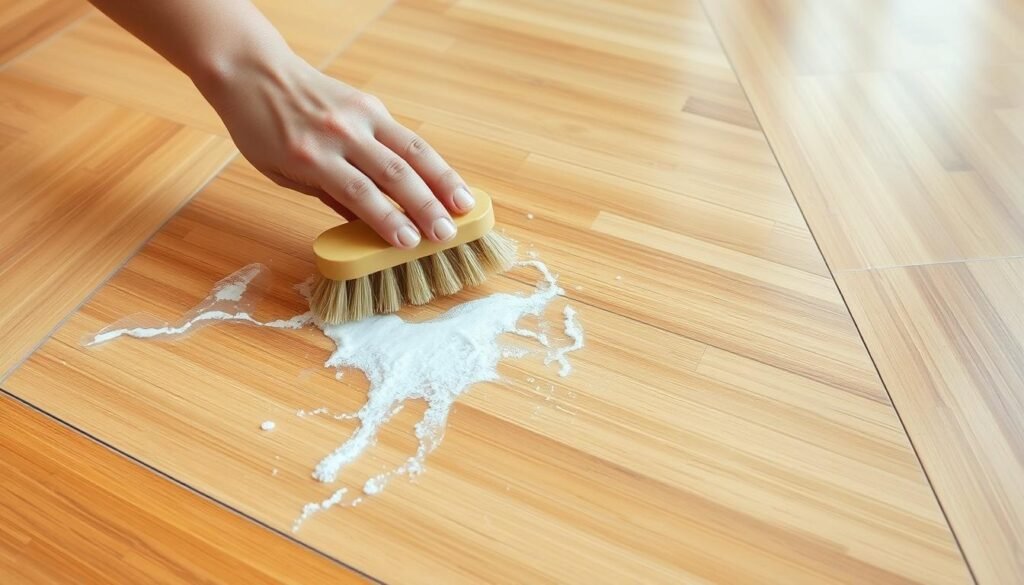
Tips for Longevity
To ensure the longevity of your bamboo tiles, we suggest a few additional tips. Avoid using harsh chemicals or abrasive cleaners, as they can damage the finish. Place rugs in high-traffic areas to reduce wear and tear. Maintaining a stable indoor climate with moderate temperature and humidity levels will help to prolong the life of your bamboo tiles.
- Avoid harsh chemicals and abrasive cleaners.
- Place rugs in high-traffic areas.
- Maintain a stable indoor climate.
Comparisons with Similar Flooring Materials
Bamboo tiles are a top pick for flooring because they’re both versatile and eco-friendly. We’ll look at how they stack up against other popular flooring types. We’ll talk about what makes bamboo tiles stand out.
Bamboo vs. Hardwood
Bamboo and hardwood flooring are both favorites, but they differ in key ways. Bamboo is more eco-friendly and durable than many hardwoods. It also does better against moisture than some hardwoods.
| Characteristics | Bamboo Tiles | Hardwood Flooring |
|---|---|---|
| Durability | High | Variable |
| Moisture Resistance | High | Low to Medium |
| Eco-friendliness | High | Variable |
Bamboo vs. Vinyl
Vinyl flooring is known for being water-resistant and affordable. But how does it compare to bamboo tiles? Vinyl is great against water, but bamboo offers a natural and sustainable choice.
- Bamboo Tiles: Eco-friendly, durable, and aesthetically pleasing.
- Vinyl Flooring: Water-resistant, affordable, and versatile.
Bamboo vs. Tile
Tile flooring is a timeless choice, known for its durability and easy upkeep. But bamboo tiles offer a warmer and greener alternative.
- Durability: Both bamboo tiles and traditional tile flooring are durable. But bamboo feels warmer underfoot.
- Maintenance: Tile flooring is easy to clean. But bamboo tiles need regular care to keep looking good.
- Sustainability: Bamboo is highly renewable, making bamboo tiles a greener choice.
In conclusion, bamboo tiles are a unique blend of durability, eco-friendliness, and beauty. They make a compelling choice compared to hardwood, vinyl, and tile flooring.
Frequently Asked Questions About Bamboo Tiles
Exploring bamboo tiles raises questions about their durability and upkeep. We’ll answer common queries to guide your choice.
How Long Do Bamboo Tiles Last?
Bamboo tiles are durable and can last long with the right care. Their lifespan varies based on tile quality, maintenance, and foot traffic. Generally, a well-cared-for bamboo tile floor can last 20 to 30 years or more.
Can Bamboo Tiles Be Refinished?
Yes, bamboo tiles can be refinished. This involves sanding and applying a new finish to remove scratches. It can make your tiles look new again. But, how many times you can refinish depends on the tile’s thickness and bamboo type.
Are They Suitable for High-moisture Areas?
Bamboo tiles are sensitive to moisture, making them less ideal for wet areas like bathrooms or kitchens. For these spaces, choose moisture-resistant bamboo tiles and follow the manufacturer’s care and installation guidelines.
In summary, bamboo tiles are a durable and eco-friendly flooring choice. Their longevity and performance depend on proper care and installation. Here are the main points:
- Durability: Bamboo tiles can last 20 to 30 years with proper care.
- Refinishing: They can be refinished to extend their lifespan.
- Moisture Sensitivity: They may not be ideal for high-moisture areas without proper sealing.
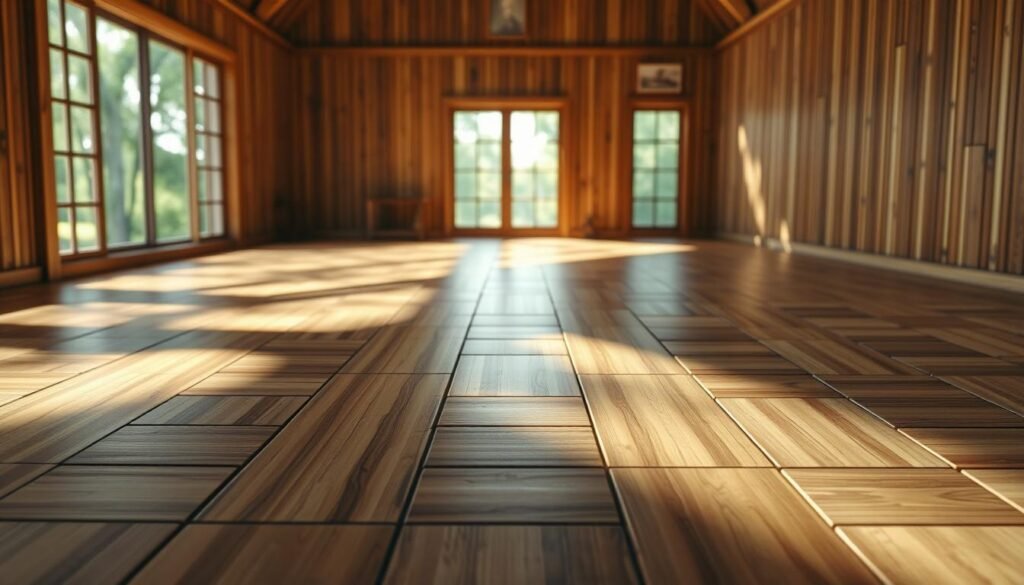
Popular Brands and Product Examples
Bamboo tiles from top brands are great for the environment and look good too. We’ll look at some brands known for quality and care for the planet.
Notable Brands in the Market
Here are some top names in bamboo tiles:
- Teragren: They make high-quality bamboo flooring, like strand woven and engineered bamboo.
- Smith & Fong: They have a big selection of bamboo flooring that’s both tough and stylish.
- California Bamboo
: They offer many bamboo flooring options, including tiles for various settings.
These brands are known for their creative bamboo flooring. They make sure their products are top-notch and good for the planet.
Recommended Bamboo Tile Products
When picking bamboo tiles, think about how durable they are, how well they handle moisture, and their style. Here are some top picks:
| Brand | Product | Key Features |
|---|---|---|
| Teragren | Carbonized Bamboo Tile | Durable, eco-friendly, and looks great with a carbonized finish. |
| Smith & Fong | Strand Woven Bamboo Tile | High-density strand woven bamboo for better durability and resistance to wear. |
| California Bamboo | Engineered Bamboo Tile | Stable and durable, with many styles to pick from. |
Choosing products from these brands means you get quality bamboo tiles. They’re sustainable and built to last.
Conclusion and Final Thoughts
Bamboo tiles are a great mix of green, strong, and stylish. They are perfect for those who want eco-friendly floors. Bamboo tiles stand out as a unique choice for your home.
Key Considerations for Your Home
Thinking about bamboo tiles for your home? They’re good for the planet and last long. Remember, keeping them in top shape is key.
Recap of Benefits and Drawbacks
Bamboo tiles are good for the environment and look cool. But, they might not do well with too much water. Think about these points to choose wisely.
Bamboo tiles are a smart pick for your home. They’re tough and green. Look into different bamboo tile options to see how they can improve your space.
FAQ
Are bamboo tiles suitable for bathrooms and kitchens where moisture is prevalent?
Bamboo tiles work well in moist areas like bathrooms and kitchens. But, they need a waterproof seal to last. Apply a waterproof coating to keep them in good shape.
How do I clean and maintain bamboo tiles?
Clean bamboo tiles by sweeping or vacuuming often to get rid of dirt. Use a mop with a bamboo floor cleaner, but don’t soak the floor. For stubborn stains, a hardwood floor cleaner can help.
Can bamboo tiles be installed over existing flooring?
Yes, you can put bamboo tiles over old floors. But, the subfloor must be level, dry, and free of old glue. It’s best to get a pro to do the job right.
Are bamboo tiles resistant to scratches and dents?
Bamboo tiles are pretty tough, but they can get scratched or dented. Use felt pads on furniture legs and avoid moving heavy things on the floor.
How long do bamboo tiles typically last?
Bamboo tiles’ lifespan varies based on care, use, and quality. With proper care, they can last 20 to 30 years or more.
Can bamboo tiles be refinished if they become damaged?
Yes, you can refinish bamboo tiles, but it’s trickier than hardwood. It’s wise to get a pro to check if refinishing is possible.
Are bamboo tiles a sustainable and eco-friendly option?
Yes, bamboo tiles are green because bamboo grows fast and needs little water and pesticides. It also absorbs more CO2 and makes more oxygen than many crops.
How do bamboo tiles compare to traditional hardwood flooring in terms of durability?
Bamboo tiles are better at handling moisture than hardwood. But, their durability also depends on quality and care. Strand-woven bamboo is very durable and resistant to scratches.
What is the average cost per square foot of bamboo tiles?
Bamboo tile prices vary by quality, brand, and installation. Expect to pay between to per square foot on average.

